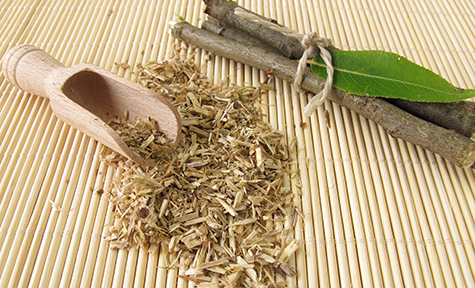Willow Bark Is a Legendary Pain Reliever

Willow bark has an important place in medicine and in human history. Known by many names– pussy willow, purple willow, black willow, it is traditionally used to reduce pain and fever and was the original source of salicin, a chemical similar to aspirin (acetylsalicylic acid) from which the drug was created in the 1800’s. The medicinal use of willow bark dates to 400 BC when people were advised to chew on the bark to reduce fever and inflammation in the body. Since then it has been used in many cultures for these purposes. Willow bark contains many benefits to the human body including antioxidants like flavonoids, tannins, and salicylates that work to aid healing.
Willow bark and its most important health-related compound salicin is used for many health reasons including:
- Headache
- Back pain – especially of the low back
- Joint pain including osteoarthritis and rheumatoid arthritis (RA)
- Gout
- Fever
- Common cold and influenza
- Menstrual cramps
- For weight loss support
Used primarily as a pain reliever, there is some scientific evidence that white willow bark supplements work, especially for back and joint pain. Taking 120-240 mg of a supplement that contains salicin daily can reduce lower back pain in some patients, studies show, and relief is felt for some even within the first week. There have also been human studies that indicate willow bark supplements help relieve joint pain, though some of them are done with a combination of other supplements such as glucosamine, ginger root, boswellia, turmeric, and cayenne which are all known to calm inflammation and support pain relief.
One challenge with supplements across the board is the differences in standardization of formulation. For example, willow bark extract can contain salicin content ranging from 6.7% to 30.7% — a big difference in how much is in each preparation. If provided in the correct dose and standard formula, studies do show that willow bark works to calm inflammation in the body, effectively reducing pain for some. In order to find out what may be best for you, consulting with a doctor is likely your best bet.
There are some important considerations when using willow bark medicinally including some reports of side effects ranging from gastrointestinal upset to allergic reaction. Remember, if you’re allergic to aspirin, you CANNOT take this type of supplement. Keep in mind that willow bark has been deemed completely unsafe for children or breast-feeding mothers as it may be dangerous for the infant. There are major interactions with any blood thinning drugs or supplements if taking willow bark or supplements containing salicin as it also thins the blood. Definitely discuss with your doctor if you have any questions about taking a supplement such as willow bark to find out if there are any special considerations for yourself.
Have you ever used willow bark medicinally? Let us know in the comments!
Resources:
Natural Medicines Database. Willow Bark. https://naturalmedicines.therapeuticresearch.com/databases/food,-herbs-supplements/professional.aspx?productid=955. Updated 1/10/2018. Accessed 2/23/18.
University of Maryland Medical Center. Willow Bark. https://www.umm.edu/health/medical/altmed/herb/willow-bark.Updated. 8/5/2015. Accessed 2/24/18.
